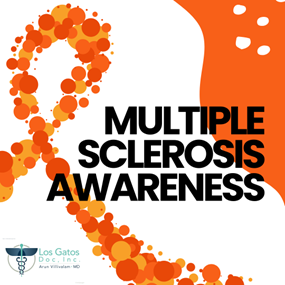Multiple Sclerosis (MS) Awareness Month is an important month that serves to raise awareness about this complex and often misunderstood neurological condition. Throughout the article, we will take a look at what MS is, the symptoms that come along with it, how it is identified and diagnosed, treatment options, as well as why it is important to spread awareness about this disease.
What is Multiple Sclerosis?
Multiple Sclerosis is a chronic autoimmune disease that affects the central nervous system, including the brain and spinal cord. In MS, the immune system attacks the protective covering of nerve fibers accidentally, causing inflammation and damage. This event causes a disruption of the flow of information between the brain and the rest of the body, which leads to a wide range of symptoms.
Multiple Sclerosis can present in several different forms, including relapsing-remitting MS (RRMS), secondary-progressive MS (SPMS), primary-progressive MS (PPMS), and progressive-relapsing MS (PRMS). Each type has its own pattern of disease progression and management strategies.
Symptoms of MS
There are many symptoms that are associated with MS, and they can vary in severity and duration. The most common symptoms include fatigue, difficulty walking, numbness or tingling in the limbs, muscle weakness, vision issues, and cognitive difficulties.
These symptoms can have a significant impact on a person’s quality of life. Mood disorders or depressive episodes can occur from these symptoms. Living with MS requires ongoing management of symptoms in addition to adaptations to daily life, support from medical professionals, and leaning on others around you.
Diagnosing MS
Diagnosing Multiple Sclerosis can be complex and challenging due to several factors. Firstly, the symptoms of MS can vary widely among individuals and may overlap with those of other neurological conditions, making it difficult to distinguish MS from other diseases. Additionally, many of the early symptoms of MS, such as fatigue, numbness, and tingling, are nonspecific and can be attributed to various other health issues. This can result in delays in diagnosis and treatment initiation, potentially impacting the long-term prognosis for individuals with MS.
Given the complexity when trying to diagnose MS, there is often a thorough evaluation to assess a patient’s medical history, symptoms, and neurological function which may include: medical history, neurological exams, imaging tests, and spinal fluid analysis.
In recent years there have been advancements in technology, like cerebrospinal fluid biomarker analysis, that have assisted in the accuracy and efficiency of MS diagnosis. This has helped healthcare providers to detect MS earlier, and monitor the disease activity over time.
Treatment Options
While there is currently no cure for MS, several treatment options are available to manage symptoms, slow disease progression, and improve quality of life. These may include disease-modifying therapies, medications to manage symptoms such as fatigue and muscle spasms, physical therapy, and lifestyle modifications.
Disease-modifying therapies (DMTs) are a cornerstone of MS treatment aimed at reducing the frequency and severity of relapses, slowing disease progression, and preventing further damage to the central nervous system. These medications work by modulating the immune system to reduce inflammation and suppress immune attacks on myelin. There are several classes of DMTs available, including interferons, glatiramer acetate, oral medications, and monoclonal antibodies. The choice of DMT depends on various factors, such as the type and severity of MS, disease activity, and individual patient preferences.
In addition to disease-modifying therapies, medications are often prescribed to manage specific symptoms associated with MS. These may include medications to alleviate fatigue, muscle spasms, pain, bladder dysfunction, and cognitive impairment. Physical therapy, occupational therapy, and speech therapy may also be recommended to improve mobility, coordination, and daily functioning.
Spreading Awareness
It is important to raise awareness about MS to reduce stigma, and to show support to those who are living with the condition. During MS Awareness month, there are various ways to get involved from activities and events, to campaigns that work to raise awareness and advocacy for better treatments and a cure.
Our Recommendation
“Many conditions can cause similar symptoms so while its possible that MS is the diagnosis, extensive evaluation is needed.”
~Dr. V. Los Gatos Doc
Got More Questions?
We are here at Los Gatos Doc for your seasons of wellness including if you or a loved one are struggling with an MS diagnosis. If you have any questions about your health, please do not hesitate to give us a call today.






